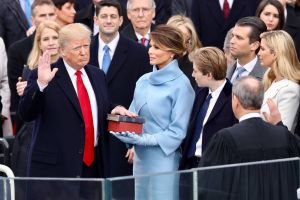The 2016 Opinion Leader Survey showed that, for the most part, there was a bipartisan consensus among US foreign policy opinion leaders on active US engagement with the world, maintaining US alliances around the globe, and the benefits of international trade.
The Foreign Policy Establishment or Donald Trump: Which Better Reflects American Opinion?
Introduction
It is an open secret that most US foreign policy experts opposed the presidency of Donald Trump. In fact, more than one hundred Republican foreign policy professionals went so far as to sign an open letter declaring that they would not vote for him. For his part, as a candidate, President Trump pledged to “drain the swamp” in Washington and said he would never take advice from the so-called foreign policy establishment, dubbed “The Blob” by a former Obama official.
The 2016 Chicago Council Leadership Survey1 , conducted before the November election, showed that, for the most part, there was a bipartisan consensus among US foreign policy opinion leaders on active US engagement with the world, maintaining US alliances around the globe, and the benefits of international trade. In fact, the views among Republican and Democratic foreign policy experts more often aligned with each other than with the portion of the general public affiliated with their same party.
Some may interpret the election of Donald Trump as the general public’s rejection of this elite consensus. But the 2016 Chicago Council public opinion survey, also conducted before the election, showed that rather than aligning with the foreign policy views of President Trump, the general public was more attuned to the broad outlines of foreign policy positions promoted by the foreign policy opinion leaders, or “the Foreign Policy Establishment.”
While the findings suggest that both opinion leaders and the public acknowledge that the United States needs allies and trading partners to succeed, they disagreed on foreign policy issues related to trade’s specific impact on job creation and the threat posed by immigration.
Opinion leaders were much more convinced than the public of trade’s ability to create jobs and were much less likely than the American public to prioritize protecting American jobs as a foreign policy goal. These differences highlight the potential appeal of candidates who emphasize trade’s detrimental impact on jobs, despite healthy public support for free trade and globalization.
Republican leaders and Republicans among the public starkly disagreed on the threat posed by immigration, with the GOP public far more likely to consider large numbers of immigrants and refugees entering the United States as a critical threat.
Finally, while opinion leaders and the public favored maintaining the US commitment to NATO and maintaining US bases in key allied countries, the foreign policy experts were much more likely to consider protecting allies’ security as a very important foreign policy goal. This could reflect a lack of awareness among the public of alliance expectations, a belief that these allies could defend themselves, or a feeling that US allies have not contributed to US military missions abroad.
Donald Trump repeatedly pitched the downsides of trade agreements on American jobs and criticized US immigration policy to great electoral effect. He has also criticized American allies in Europe, Asia, and the Middle East for being free riders. These issues have continued to play prominent roles early in his presidency. While there are differences between the expert consensus and typical Americans on these points, the public and leadership are generally aligned on most foreign policy questions about international engagement. To be sure, there is evidence of partisan divisions, but at this point, there is no evidence of a hard turn toward isolationism. President Trump’s ability to shift public and leader opinions will prove to be an important test of the durability of the broader foreign policy consensus in the coming years.
Methodology and Limitations
This report is based on a leadership survey conducted August 25 to October 25, 2016 among 484 foreign policy opinion leaders from executive branch agencies, Congress, academia, think tanks, the media, interest groups and NGOs, religious institutions, labor unions, and business. While the survey team worked hard to design a sample that would reflect broad networks of policy leaders on both sides of the aisle, as in previous Chicago Council leader surveys, the final sample included a disproportionate number of Democrats (50% Democrat 17% Republican, 33% Independent). For this reason, the leader results are shown by partisan affiliation and not as an overall leader average.
To more closely reflect the composition of previous Chicago Council Survey leaders surveys, these data were weighted by target sample group to reflect the proportional representation of leader groupings within previous leader samples. As was true in the 2014 Chicago Council leadership survey, low response rates from business, labor, and religious leaders required heavily overweighting them. Therefore, individuals using these data for their own research purposes should use caution in interpreting the results from these small subgroups on their own. 15 In addition, while this leader survey should not be interpreted to reflect the views of elected officials, the respondents are influential members of their organizations, and many who are currently outside government service have held positions in government in the past. While this survey’s sample was carefully and thoughtfully constructed to sample the full range of foreign policy opinion leaders, it cannot be directly compared to a scientifically executed public opinion sample (such as the 2016 Chicago Council Survey) in terms of margin of error or other familiar survey statistics. Despite these limitations, the Council on Global Affairs is confident the results will shed light on the views of opinion leaders and improve the dialogue around US foreign policy and policymaking.
In addition, while this leader survey should not be interpreted to reflect the views of elected officials, the respondents are influential members of their organizations, and many who are currently outside government service have held positions in government in the past. While this survey’s sample was carefully and thoughtfully constructed to sample the full range of foreign policy opinion leaders, it cannot be directly compared to a scientifically executed public opinion sample (such as the 2016 Chicago Council Survey) in terms of margin of error or other familiar survey statistics. Despite these limitations, the Council on Global Affairs is confident the results will shed light on the views of opinion leaders and improve the dialogue around US foreign policy and policymaking.
- 1This report is based on results from the 2016 Chicago Council Survey and the 2016 Chicago Council Leadership Survey. The leadership survey was conducted in partnership with the University of Texas National Security Network among more than 400 professionals working on foreign policy issues. For more details on the sample, see the methodology section on page 15.








